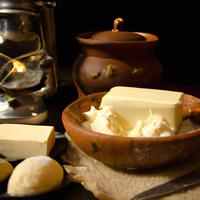
1 serving (14 grams) contains 100 calories, 0.0 grams of protein, 11.0 grams of fat, and 0.0 grams of carbohydrates.

Log this food in SnapCalorie

Nutrition Information
Calories |
1690.6 | ||
|---|---|---|---|
% Daily Value* |
|||
| Total Fat | 186.0 g | 238% | |
| Saturated Fat | 50.7 g | 253% | |
| Polyunsaturated Fat | 0 g | ||
| Cholesterol | 0 mg | 0% | |
| Sodium | 1521.5 mg | 66% | |
| Total Carbohydrates | 0 g | 0% | |
| Dietary Fiber | 0 g | 0% | |
| Sugars | 0 g | ||
| protein | 0 g | 0% | |
| Vitamin D | 0 mcg | 0% | |
| Calcium | 0 mg | 0% | |
| Iron | 0 mg | 0% | |
| Potassium | 0 mg | 0% | |
* Percent Daily Values are based on a 2,000 calorie diet. Your daily values may be higher or lower depending on your calorie needs.
Food Attributes
Source of Calories
About Non dairy butter
Non-dairy butter is a plant-based alternative to traditional butter, catering to vegans, individuals with lactose intolerance, or those seeking low-cholesterol options. Typically made from oils such as coconut, avocado, or olive, it may also include nuts, seeds, or emulsifiers for texture and flavor. The origin of non-dairy butter can be traced back to the rise of plant-based diets and culinary traditions emphasizing healthier fats. It is commonly used in a variety of cuisines, including vegan baking, sautéing, and as a spread. Non-dairy butter is often lower in saturated fat compared to traditional butter, depending on the ingredients, and contains heart-healthy fats from sources like nuts or olive oil. However, it can be calorie-dense and may contain added preservatives or artificial flavorings in processed varieties. Choosing minimally processed options can offer a nutrient-rich and versatile addition to both sweet and savory dishes.



